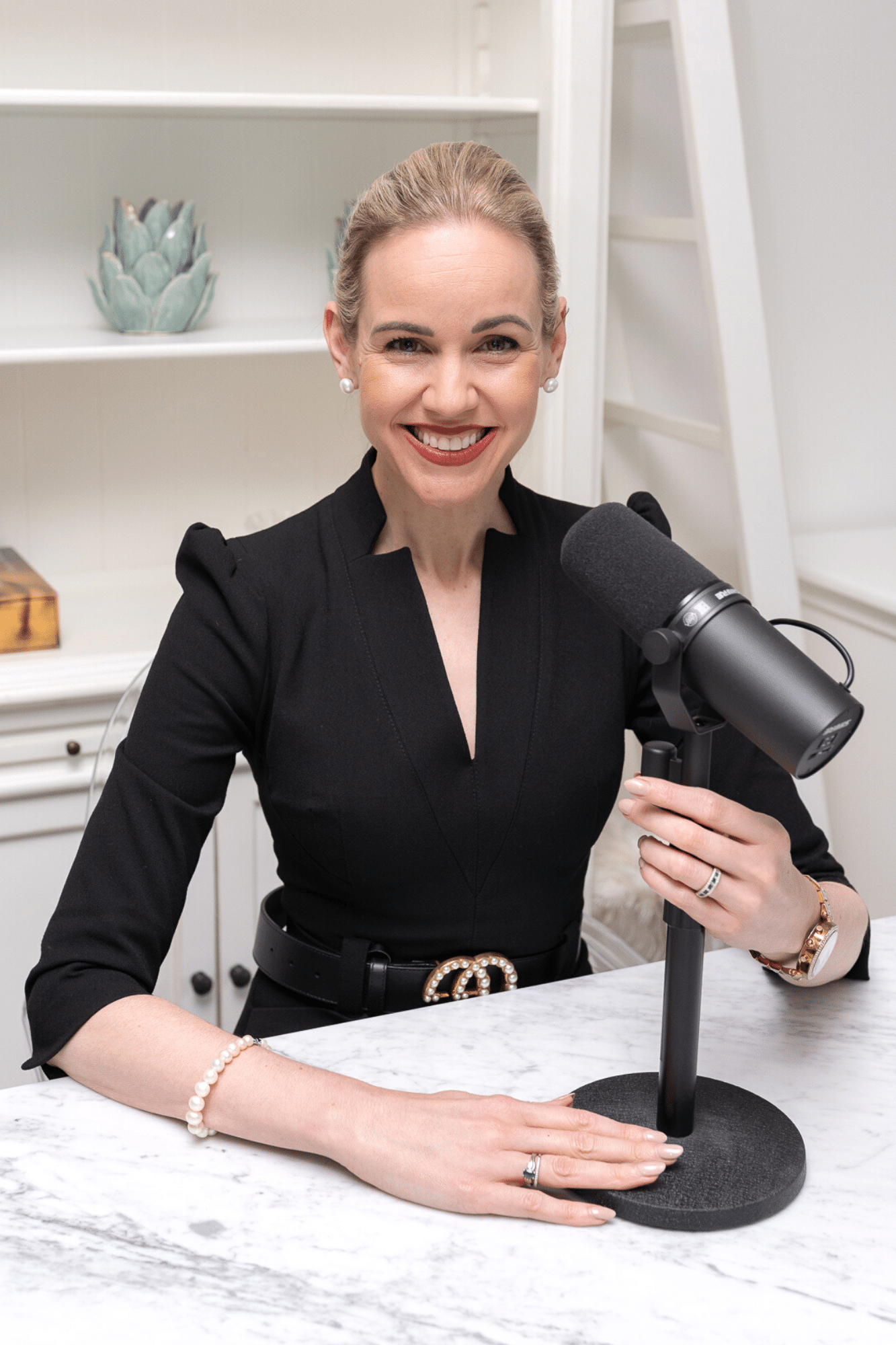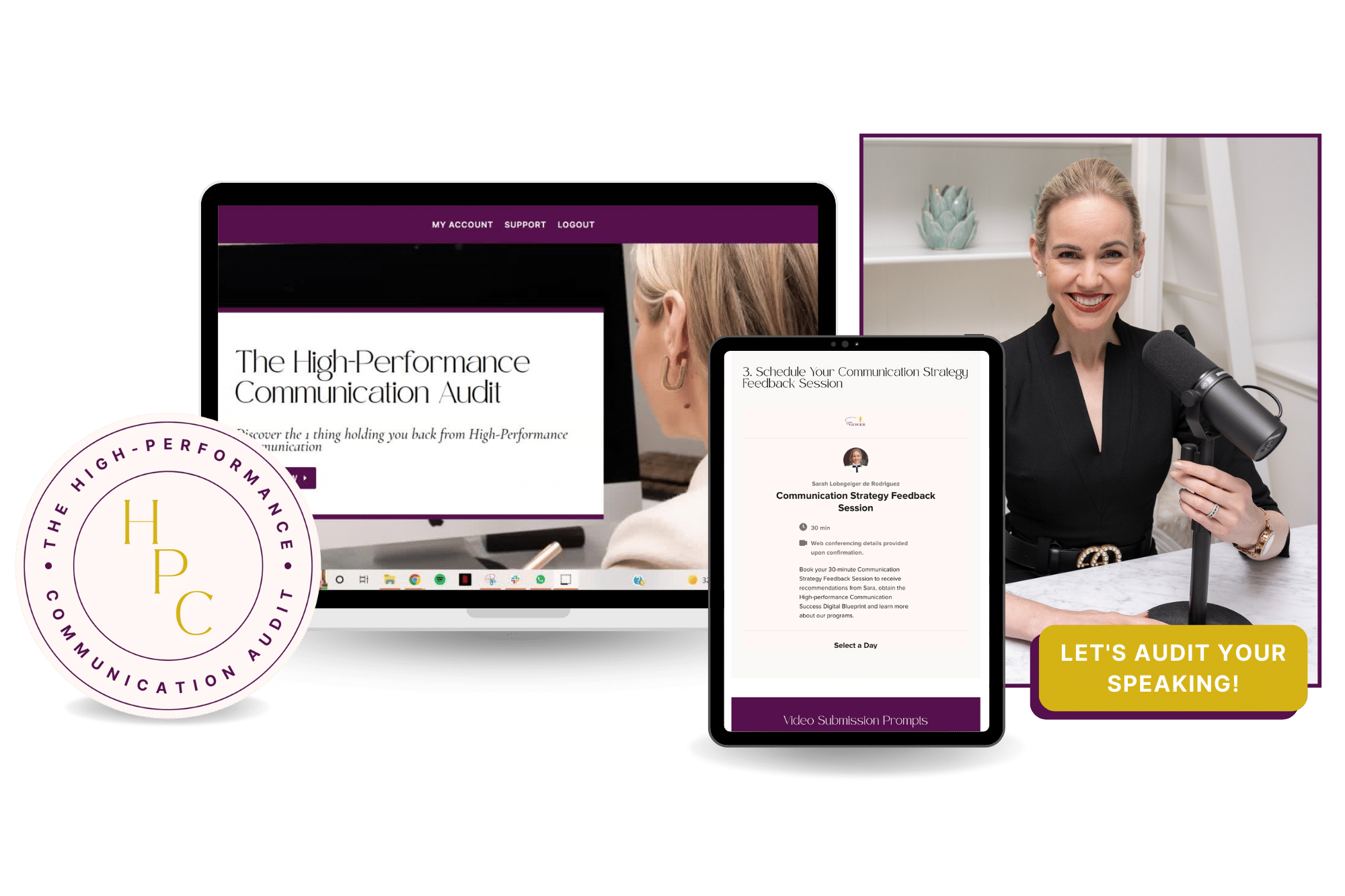Social Intelligence
Public Speaking CPR
We All Need a Public Public Speaking Pep Talk From Time to Time

We’ve designed this content to help you with public speaking anxiety and give science-backed information on what to look for if you want to increase your presentation skills so that you can better serve your audience, clients or stakeholders. First, you’ll take the Public Speaking Anxiety Scale to test the degree anxiety is impacting, then watch a mini-tutorial before learning some actionable strategies.
The ability to present a compelling, logical, and influential message in public is a skill you can't put a price on.
In my work as a speaker, executive coach, and communication scientist, I’m amazed by the number of people I meet daily who dream of getting up in front of a room of people and present comfortably. My passion is supporting these people to fulfil it.
But I can’t help but wonder…
Why do so many people shy away from the opportunity to present and share their innermost beliefs, values and convictions? I mean, public speaking is one of the best platforms to do that with. It can also sky-rocket your leadership career and give you a competitive advantage no matter your industry.
Although we’ve established that people want to increase their public speaking confidence- my next question is how many find a process that works?
Maybe you’re a CEO on the hunt for a program for your emerging executives, or perhaps you’re lying awake dreading tomorrow’s presentation; whatever it is, this article is going to give you some CPR for your public speaking.
CPR For Your Public Speaking
This blog is best digested in 4 manageable chunks. First, I’ve aimed to give you a comprehensive overview that will help you to consider your public speaking concerns. To do that, all you need to do is scroll down the page slowly and sequentially to move through your tasks.
You might want to bookmark this page to refer back to later – because it could take more than one sitting!
Here are the steps for you to get a solid Pep Talk for your Public Speaking.
- Take the Public Speaking Anxiety Scale
- Watch the vlog: Embrace your Emotions Public Speaking CPR
- Read the blog post
- From the boardroom, to the podium, over the phone, or behind the lens – I’ll meet you at the communication barrier you’re facing and help you to smash it!
I’ve provided speaking assessment and modern elocution training to people from all sorts of professions at different stages in their career path from middle management through to company directors. Sign up for the High-Performance Commuiation Audit now.
Watch This Next
Today I feel convicted to talk to you about one single point. I hope you’ll embrace it and hold it close.
Your feelings don’t predict the outcome or quality of your performance.
Now it’s time to uncover what it takes to become a magnetic and profound public speaker.
#1 Improvement starts with Concrete Tactics, Behaviour Change & Expert Feedback
I’ve worked with Ted Talk participants, Newsreaders, University professors, Film actors, lecturers, Criminal Lawyers, Clergy, CEOs and banking executives, Diamond dealers, E-Sport commentators, Luxury goods salespeople, and even train platform announcers… And yet, rarely do I meet a person who fully embraces public speaking as part of communication fitness in my job.
Why is it that so many people shy away from the opportunity to present and share the innermost beliefs, values and convictions with their team, their community, or maybe even the globe?
If more people only knew a concrete process to get better at public speaking that works, the world would be a more prosperous place.
#2 Why are so many of us hyperventilating at the thought of public speaking?
Are you getting blindsided by intense self-doubt that’s holding you back from participating in public speaking?
Think about it.
The best speeches are emotion fuelled.
This is why your emotions are in overdrive. If public speaking for an exam or presentation isn’t pumping you up cognitively and getting your heart racing, you should be worried. Public speaking is an intense cardio workout for your communication, and most people didn’t train for it, which is why it feels horrible.

#3 It’s estimated that 77% of people dread public speaking
I can give you many reasons why I think this is the case, but I don’t want this to be another pithy blog post on public speaking. So instead, I’m here to give some heartfelt CPR for your Public Speaking so that it can soothe you and hopefully inspire you.
So in addressing the topic of public speaking anxiety, I want to add a unique and insightful perspective for you to consider.
Although I’m a communication scientist, an executive speaking coach with a speech and language pathology background, and entrepreneurship, first and foremost, I am a professional opera singer.
Although I would typically default to science in giving communication solutions today, I want to share my artistic experience as a performer because this is the best place to comment about performance anxiety.
Classical musicians are the masters of performance anxiety. We operate in an industry that seeks the impossible- perfection, balance, and symmetry. Through our training, we learn to live with performance anxiety. Still, we never overcome it because the skill of an expert versus an amateur is defined by our ability to perform at an elite level despite performance anxiety.
The years of mastery and practice focus on learning the concrete, technical skills needed for a perfect performance. It’s through embracing technique that we achieve success on stage. Through the years of tactical skill and behavioral training, we’ve learned that focusing our attention on how we feel about going onstage physically, psychologically, or even cognitively is not the predictor of a good performance outcome.

INTRODUCING OUR PREMIERE ELITE PUBLIC SPEAKING TRAINING
VIP DAY FOR CEO’S ENTREPRENEURS & FOUNDERS
Presentation skills training shouldn’t be a time suck and leave you feeling underdone, especially since wasted minutes are lost business and career opportunities.
Discover this step-by-step way in a day to become a talented and charismatic speaker for public speaking, presentations & media appearances on stage, in the boardroom or behind the lens without spending years trying to overcome performance anxiety.
#4 So if Public Speaking Success is not about how I feel, what do I need to improve?
Public speaking success is the outcome you get when you learn and fine-tune a tactical set of skills and behaviours. Focusing on how you feel about it distracts you from the work you need to do to improve. With concrete, science-backed training, every human can get better at public speaking.
There are objective, measurable behaviours that exemplary public speakers demonstrate that can be trained and learnt.
Don’t let the feelings whirlpool suck you in; focusing on how you feel about public speaking is self-defeating.
In my training as an opera singer, I’ve learnt that resilience on stage comes from dependency on technical skills (my capacity to sing high notes, my musical and theatrical literacy, my command of the operatic languages, my rhythmic skills, my imagination and artistic expression malleability and cognitive and social skills to follow a conductors directives and work in ensemble with my colleagues on stage).
This is a form of proficiency that enables me to step on stage and have a good sense of what I aim for. My technical skill reduces error risk and increases predictability in the high-performance context. This is the exact mindset you need for your public speaking development.
While you don’t need to sing, you need to understand mechanical skills like speech pacing and flow, vocal vibration and tone, gesture and gaze, language tools and more.
#5 Perfect Speakers are Boring
Well, that’s liberating. Now you heard it- stop worrying about being perfect.
Most of my clients come to me intending to speak perfectly on stage, in videos in the C-Suite- and then I briefly share the research around that. So, to save me some time when I meet you, read this carefully.
The act of speech is expressive.
When we talk with our friends on the phone, they know how we feel by the sound of our voice.
When we terminate an employee, we take care with the logical flow of our words.
When we grieve or rejoice, our tone, facial expressions, and phrases are used to capture the mood.
This is communication.
Communication is the medium through which we express our identity and engage with the world around us and try and make sense of the world around us and bring things we like to us.
So why would the sole goal be to deliver a perfect speech?
So next time, you are required to present a check for limiting thoughts that will derail you. Communication is not perfect. If we aim for that, we’re at risk of becoming boring.
It’s a two-way interchange between your most profound musings in your brain that will hit someone’s mind And make them see something from a different perspective.
Public Speaking must focus on the outcome of CHARISMA, not perfection.
This is very obvious to the performer’s brain, but let me elaborate if you’re not a performer.
Many MBA and career pathways do not prepare us to understand this perspective.
If you must address a group of people (even in a zoom meeting room)- they constitute an audience of some form. Due to this, you’re obligated to make your words get buy-in.
You must use your audience’s time well and serve them with information that is novel and engaging.
This is why we “lend someone our ears.”
If you feel that a performance-based approach is a bit showy, pretentious or insincere, think again. Performance is an act of service designed for the audience. It is not egotistical. I sing everywhere, but not everywhere I sing constitutes a performance- that takes the gift of an audience to want to listen to me.
So you must serve your audience.

#6 Brilliant Performers are made, not born
The making of your public speaking skill will be your openness to address your performance fragility head-on, look it in the eye and treat it like the gym.
Arriving at the venue in your fancy pants and waiting to get on stage is but the tip of the iceberg when it comes to public speaking.
Preparation is vital, and skill acquisition should be lifelong.
But there’s a catch.
Reading your speech over and over is not preparation.
There is a research base for performance preparation, so just like you don’t want to wing a marathon, you don’t want to wing the workout to get you there.
Many speaking coaches are not alert to the scientific evidence behind what it takes to prepare a client to deliver their best performance. So if someone has, for whatever reason, led you to believe you should rehearse your speech over and over, memorise it, or repeat it in front of a mirror, stop right there. These behaviours will cull any charismatic outcome.
#7 If I want to become a magnetic & charismatic communicator where should I Begin?
The market for public speaking courses is competitive.
While there are many different opportunities you can choose from if you want to excel as an orator, I like to divide the options into 2 simple categories.
1. Speaker Training that doesn’t work.
Now, I’m not being smart, but it’s worth considering. I’m against negative marketing, so I’ll move to my next point shortly, which will hopefully help you identify the kinds of things you need to be looking for if you want to learn the Science of Public Speaking. For, while it counts on expressive communication strategies, it’s got enough research backbone to call it a science.
2. Speaker Training that works.
Options that come under this category involve working with a consultant who knows how to train people in concrete, science-backed tactics that build charisma, logical flow and audience engagement.
There’s a growing pile of research into features of charismatic presenters that is coming out of the speech science disciplines and psychology in recent years. But, unfortunately, many myths still circulate in the leadership management and consulting space. This is mainly due to well-meaning but ill-informed coaches with executive suite or business management experience but no formal training in Communication Science in the vital areas of vocal physiology and acoustics, interpersonal communication tactics, linguistics, and psychology.
Due to the urban public speaking myths circulating, we need more connection between academia and the corporate sector or more representation through consultants that create a bridge between evidence-based research and practical skills training.
Some common public speaking myths that research has proven false include:
- To increase your charisma for executive presence, you must have a low pitched voice (the opposite is the case).
- Charisma is a magical quality that you’re born with (false, charisma is an outcome influenced by a set of concrete verbal and non-verbal tactics that make your message magnetic, as proven by several high-level case studies in speech science).
- Speaking slowly and calmly is the best approach when presenting (False, there is a specific rate of speech and delivery that your listeners prefer, and it’s not slow. Some studies have found that slow speech made listeners perceive the speaker as poorly prepared and condescending).
- Getting on stage with high energy is all it takes (False. There are specific rhetorical and figurative content features you can add to a speech that will increase your charisma ratings immediately).
- If you’re worried about presenting well, you should just read the speech (False. Eye contact with the audience is one of the core tactics necessary for high charisma ratings.
- Lecturers are good at public speaking. (False, just because someone does something regularly doesn’t make them good at it. Two studies have found that lecturers and engineers tend to be the professions that receive the highest boredom ratings from an audience. Who gets the highest ratings? In the corporate world, Bankers are often the highest ranking. Why is this the case? Although I’ve not uncovered a study on the reasoning behind this, there is a limitless amount of research into the cost advantages of charismatic leaders over transactional leaders in terms of financial benefits.

#8 Presentation Literacy teaches you other things
There’s so much to be said for public speaking strategies and tips that go beyond the limits of a blog post. But I hope this article has given you a chance to see keynote speeches and presentations from a fresh and liberating perspective.
Public speaking is an enriching addition to your expressive identity and one of the best ways to learn what makes people tick when communicating with you.
And that’s what I reveal and go into so deeply through action-based training in my programme, The C suite. So join the waitlist and set aside some time to get ready for the C suite by starting to look at possible limiting beliefs or intrusive thoughts that you have concerning this critical space.
Holding back from developing your public speaking will set you back.
It’s a skill that companies want.
It’s a skill that will increase your social resonance and relevance.
It can propel or combust your career.
And if you build your skills as a public speaker, and you’ve got great values and grand dreams and visions, you can change the world.
🔗 Related blog post: 10 public speakers, ranked, that will inspire your speaking style, fast.
It’s time to say goodbye to feeling overwhelmed about your communication skills! Because – LISTEN TO THIS- you can actually improve your speaking ability.

Want to learn more communication skills to amplify your success?
If you want to improve your communication, you need to know this:
There are 6 basic bottlenecks that can hold you back from clear and confident communication.
You need to learn what your #1 bottleneck is before you can fix it.
Solving this problem for clients from all over the world is what I do all day, every day through my modern elocution services…
Discover your critical bottleneck that’s holding your confident speaking back- see more info here.
Did you enjoy this post? Make sure to subscribe to our YouTube channel to get more content to increase your communication skills!
About the Author
Dr Sarah Lobegeiger de Rodriguez is a Keynote Speaker, Executive Speaking Coach, and Opera Singer who likes to play with words, sounds, and your impact.
Her academic background is in Music Performance, Communication Science and Speech & Language Pathology. She assists executive communication clients all over the world as a communication consultant with strong expertise in CEO, Founder and Entrepreneur communication strategies.
Connect with Sarah on LinkedIn.
© CADENZA
Level 14, 380 St Kilda Road, Melbourne, 3004
Privacy Policy
Terms & Conditions
Position Statement on Racism
